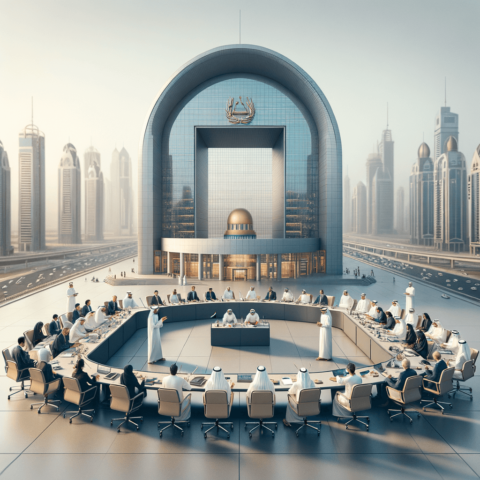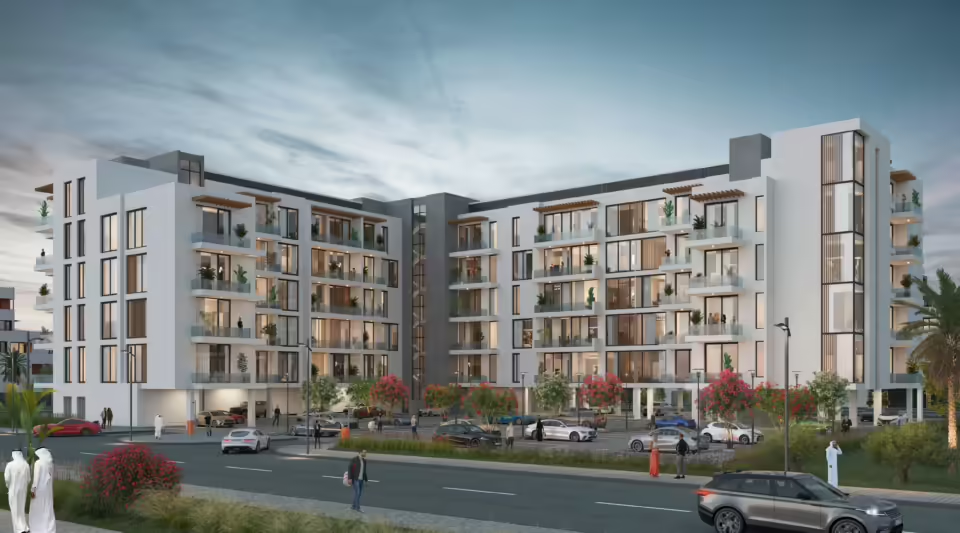
HH Sheikh Ahmed bin Saeed Al Maktoum Updates Dubai Demand Side Management Strategy 2050
July 2, 2024
#DubaiDestinations: Discover Dubai’s Unique Summer Charm
July 4, 2024Dubai’s Ministry of Finance has launched the second session of the ‘Customer Councils’ as part of the ‘Zero Government Bureaucracy’ program. This initiative is a critical step towards achieving the UAE Centennial 2071 goals and streamlining government operations.
A Vision for Zero Bureaucracy
Dubai’s Ministry of Finance’s ‘Zero Government Bureaucracy’ program encapsulates an ambitious vision aimed at eradicating unnecessary administrative procedures by 2024. This initiative is not just a short-term goal but a significant step towards realizing the UAE Centennial 2071 objectives. By envisioning a future marked by streamlined governmental processes, the program aims to set a new standard for efficiency and customer satisfaction. This aligns perfectly with the Centennial’s aim of positioning the UAE as the best country globally in various domains, including government services and economic competitiveness.
The vision integrates seamlessly into Dubai’s broader economic and social strategies. Economically, it aims to enhance the ease of doing business, thereby attracting more investments and fostering innovation. By reducing bureaucratic hurdles, the government aims to create an environment conducive to entrepreneurship and free enterprise, aligning with Dubai’s goal of becoming a global economic hub. Socially, the program aspires to improve the quality of life for residents and expatriates by making government services more accessible, user-friendly, and efficient.
Through the elimination of redundant processes and the adoption of technology-driven solutions, Dubai is setting an example for modern governance. It marks a significant cultural shift towards a more agile and customer-focused government. This transformation is anticipated to reflect positively on Dubai’s global standing, offering a blueprint for other nations to follow. The bold commitment to zero bureaucracy also serves to enhance trust between citizens and the government, fostering a collaborative environment essential for sustainable development.
Innovative Approaches to Customer Experience
In an ambitious bid to eradicate bureaucracy, Dubai’s Ministry of Finance is employing cutting-edge methods to revolutionize customer experience. A pivotal aspect of this effort is the engagement of ‘Customer Councils,’ where diverse stakeholders converge to enhance various facets of the Ministry’s services. During these councils, representatives from international financial organizations, government procurement specialists, and individuals handling ministry service inquiries collaborate to streamline procedures and heighten customer satisfaction.
The use of **interactive labs** plays a crucial role in this transformation. These labs function as dynamic environments where best practices are shared, and innovative solutions are prototyped in real time. Participants engage in hands-on activities that simulate customer service scenarios, enabling them to identify pain points and develop practical improvements swiftly.
**Brainstorming sessions** further fuel this innovative atmosphere by fostering an open exchange of ideas. These sessions are designed to break down silos, encouraging participants from different sectors to contribute fresh perspectives. By leveraging collective intelligence, the Ministry can pinpoint inefficiencies and outline more intuitive service pathways.
**Design thinking** is another critical methodology in this initiative. By placing the end-user at the core of service development, the Ministry ensures that new processes and tools are not only efficient but also user-friendly. Through iterative cycles of ideation, prototyping, and testing, solutions are refined until they meet the highest standards of effectiveness and ease of use.
By integrating these innovative approaches, the Ministry of Finance aims to set a new benchmark in customer experience, ultimately aligning with the broader goals of Dubai’s zero bureaucracy vision and propelling forward the UAE Centennial 2071 objectives.
Efficient Business Models and Proactive Services
Dubai’s Ministry of Finance is setting a new paradigm by adopting highly efficient business models and delivering proactive, integrated services. By 2024, the goal is to streamline various governmental procedures, facilitating a seamless experience for businesses and citizens alike. One innovative approach involves the integration of digital platforms that allow users to complete multiple processes within a single interface. For instance, the new ‘One-Stop-Shop’ portal aims to consolidate different governmental services, enabling individuals and businesses to acquire permits, pay fees, and manage compliance requirements without redundant steps.
Furthermore, real-time data analytics are being deployed to predict customer needs and automate routine processes. Imagine the ability to receive notifications about upcoming compliance deadlines or even automatically renewing necessary licenses. These functionalities are designed to remove the friction typically associated with bureaucratic procedures, thereby enhancing efficiency.
In terms of proactive services, the Ministry is also leveraging AI-driven chatbots to answer queries and guide users through complex processes. This not only reduces the load on human customer service agents but ensures that support is available around the clock. Future initiatives include further integrating blockchain for secure, transparent transactions and expanding the use of IoT (Internet of Things) for efficient resource management.
By reducing redundant procedures and automating routine tasks, these measures will significantly cut down time and costs associated with interfacing with the government. This holistic approach to administrative efficiency is expected to revolutionize how citizens and businesses interact with public services, complementing the innovative customer experience methodologies discussed in earlier chapters.
Interactive Labs and Stakeholder Engagement
Interactive labs and stakeholder sessions are pivotal in Dubai’s mission to achieve ‘Zero Bureaucracy.’ These labs function as real-world testing grounds where various government procedures are simulated, evaluated, and optimized. The interactive nature allows participants to experience processes firsthand, identify pain points, and brainstorm solutions in real-time.
In these labs, diverse stakeholder groups, including citizens, business owners, and public servants, come together to offer multiple perspectives. By engaging these varied groups, the labs capture a more comprehensive understanding of the challenges faced by different segments of society. Participants are encouraged to provide candid feedback through structured sessions, incorporating both qualitative and quantitative data to robustly evaluate current methodologies.
One compelling component is the use of immersive technologies—virtual reality and augmented reality. These tools help visualize complex processes, enabling stakeholders to interact with digital twins of government systems. This immersive experience is crucial for identifying inefficiencies that might be overlooked in a traditional review setting.
The iterative nature of these sessions ensures ongoing refinement. Stakeholder feedback is continually looped back into the development cycle, allowing for rapid prototyping and adjustment of policies and procedures. This flexibility enhances the agility of government services, making them more responsive to citizen needs.
Through these interactive labs, Dubai’s Ministry of Finance not only gathers invaluable insights but also fosters a culture of collaboration and innovation. This approach ensures that solutions are not only theoretically sound but practically effective, paving the way for a truly streamlined bureaucracy by 2024.
Proposed Solutions from the Customer Councils
The Customer Councils sessions have been pivotal in identifying impactful solutions aimed at revolutionizing the current government procurement processes in Dubai. During these sessions, a multitude of recommendations emerged, focusing specifically on automation and enhanced communication mechanisms. This chapter provides an in-depth exploration of these proposals.
Automation was a cornerstone of the proposed solutions. By leveraging advanced technologies like AI and machine learning, repetitive and time-consuming tasks can be automated, thereby significantly reducing manual intervention. This not only promises a substantial decrease in processing times but also minimizes errors that typically arise from human input. Automated systems can handle data entry, document processing, and even preliminary decision-making, freeing up government employees to focus on more value-added activities.
Improving communication mechanisms was another crucial area highlighted. The councils suggested the implementation of an integrated communication platform that could facilitate seamless interaction between different government departments and stakeholders. Such a platform would ensure that all parties are aligned and informed in real-time, reducing delays caused by miscommunication and bureaucratic red tape. Enhanced communication channels, including chatbots and AI-driven customer service, would also improve the experience for citizens and businesses, making it easier for them to obtain information and services swiftly.
These solutions collectively aim to reduce administrative burdens by eliminating unnecessary steps and optimizing those that remain. The shift towards a more streamlined and efficient system is expected to lead to faster procurement cycles, reduced costs, and enhanced satisfaction for both government employees and the public. As a result, these initiatives align seamlessly with Dubai’s broader ‘Zero Bureaucracy’ goals and set the stage for a future where government services are not only faster but also more efficient and user-centric.
The Future of Government Services in Dubai
The future vision for government services in Dubai, as part of the Ministry of Finance’s initiative to eradicate bureaucracy by 2024, is nothing short of revolutionary. By aiming to reduce procedure timelines by at least 50% and eliminate unnecessary requirements, the Ministry of Finance envisions a streamlined, efficient apparatus that directly aligns with the ‘We the UAE 2031’ vision. This ambitious roadmap is set to transform the customer experience, enhancing the ease and efficiency with which residents and businesses interact with government processes.
In practical terms, this means that what once took weeks or even months could be accomplished in days, thanks to automated systems and simplified procedures. Gone will be the days of extensive paperwork and multiple visits to different government offices. Instead, businesses will find that their operational timelines are substantially shortened, freeing up resources to focus on growth and innovation.
Aligning with ‘We the UAE 2031’ plays a crucial role in shaping Dubai’s future. This national vision emphasizes the development of world-class infrastructure, fostering an innovation-driven economy, and improving overall quality of life. By modernizing government services, the Ministry of Finance contributes directly to these broader goals. This initiative not only promises a more dynamic and responsive government but also significantly enhances Dubai’s attractiveness as a global business hub.
The broader implications are profound. Entrepreneurs and investors will find Dubai’s business environment more appealing due to the reduced bureaucratic hurdles. This could lead to increased foreign investment, a surge in startup activity, and a boost in economic diversification. The simplified, efficient government processes will support the burgeoning tech and innovation sectors, facilitating quicker, smoother scaling of businesses.
In essence, the future of government services in Dubai aims for a paradigm shift—one that aligns with national goals, halves processing times, and removes redundant requirements, fostering an environment conducive to economic growth and enhanced quality of life.
Continuous Improvement and Stakeholder Collaboration
Continuous improvement and stakeholder collaboration lie at the heart of the Ministry of Finance’s initiative to eradicate bureaucracy and modernize government services by 2024. To ensure the program’s success, consistent and transparent communication channels have been established between the Ministry and its diverse stakeholders, which include individuals, institutions, and the business sector.
Regular feedback loops are essential for identifying pain points and areas of inefficiency. By fostering an environment where stakeholders can freely voice their experiences and suggestions, the Ministry can make informed decisions and adapt swiftly to emerging needs. This collaborative approach not only accelerates the decision-making process but also ensures that solutions are both pragmatic and impactful.
One of the most significant anticipated outcomes is the enhancement of customer experience. Businesses will benefit from streamlined processes that reduce administrative burdens and expedite services, thus fostering a more conducive environment for economic growth. Likewise, individuals will find greater ease in interacting with government agencies, leading to improved satisfaction and trust in public services.
Moreover, institutions that collaborate closely with the Ministry can expect to see their operational procedures simplified, allowing them to focus on their core missions without being hampered by bureaucratic red tape. This ongoing dialogue doesn’t just resolve immediate issues but also paves the way for future innovations, ensuring that Dubai’s governmental framework remains agile and responsive to the needs of its stakeholders.
Conclusions
The ‘Zero Government Bureaucracy’ program by Dubai’s Ministry of Finance is a trailblazing effort to streamline government procedures, enhance customer experience, and achieve long-term national goals. Through innovative approaches and continuous stakeholder engagement, Dubai is set to transform its bureaucratic landscape, benefiting both the community and the business environment.





